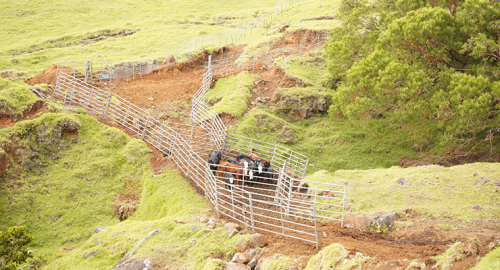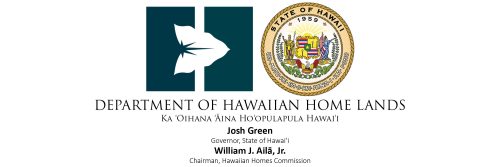New Plan Guides Kahikinui Forest Restoration
FOR IMMEDIATE RELEASE
December 6, 2022
New Plan Guides Kahikinui Forest Restoration
(Kahikinui, Maui) – A project to restore a 4,500-acre portion of native forest on the slopes of Haleakalā that began over 25 years ago has recommenced through the efforts of native Hawaiians from the Kahikinui Homestead Community.
The Department of Hawaiian Home Lands (DHHL) issued a Right of Entry (ROE) Permit to the Ka ʻOhana o Kahikinui, INC. (KOOK) homestead association following approval of the Hawaiian Homes Commission (HHC) in June 2022. The ROE allows for the community organization to capture and remove feral cattle from DHHL lands within the remnant native forests of Kahikinui.
Ahead of the ROE issuance, HHC requested that DHHL provide assistance in the form of technical support and guided facilitation efforts that would guide KOOK into the development of a new Feral Ungulate Control Plan. DHHL staff provided technical support to KOOK through the facilitation of meetings and plan development. Department of Land and Natural Resources (DLNR) Division of Forestry and Wildlife (DOFAW) staff also played a key guidance role in the orchestrating of the plan. The new document will guide the community’s effort to reduce the ungulate population within the area bordered by Nakula Natural Area Reserve and Haleakalā National Park.
The plan, completed in early 2022, provides a multi-method approach to reduce the population of ungulates including the herding, capture, and distribution of feral cattle to homestead associations on Maui and their members. The plan also includes a coordinated effort with the DLNR DOFAW for aerial control of ungulates, including goats and deer in a phased approach.
“Restoration of our native forests should always be held to a high standard of importance,” said Hawaiian Homes Commission Chair William J. Ailā, Jr. “However, beyond the acknowledgment of the rehabilitation needs, what is key here is that this work is being led by the native Hawaiian homesteaders of the area. They have asked to take on the responsibility, and the Department is pleased to partner in a guidance role and support them as they tackle this critical kuleana.”
In 1995, HHC approved the initial Kahikinui Forest Reserve Community Management Conceptual Plan that aimed to reverse the decline of native forests on Hawaiian Home Lands in the Kahikinui moku. The plan coincided with the establishment of Hawaii Administrative Rule 10-3-30 for DHHL Kuleana Homestead leases.
Since then, various efforts, largely focused on hunting practices, have proved to be slow-moving attempts to control the ever-growing ungulate populations. Experts have estimated that there are now over 2,000 animals within the forest preserve, a number that will continue to exponentially grow without the proper removal and management of ungulates in the area.
The forests of leeward Haleakalā were once rich in native species, dominated by koa and ʻōhiʻa, and full of diverse understory trees, shrubs, lichens, and ferns that formed complex and stable ecosystems that supported communities with sustainable fresh water and forest products. DHHL lands in Kahikinui contain the largest and most intact native forests remaining in the area.
However, the introduction of cattle, goats, and deer has had devastating impacts on the Kahikinui forest. The area is now faced with extreme degradation from grazing and trampling, invasion of alien plant species, and habitat fragmentation. Feral ungulates destroy native understory plants, which has led to the loss of culturally important species and facilitated invasion by noxious weeds. In addition, ungulates can also facilitate the increase of Rapid ʻōhiʻa Death by damaging trees and creating openings for the disease to spread.
While large canopy tree species often persist despite ungulate disturbance, forest understory declines dramatically, exposing spoil and allowing for erosion cycles to take hold. This disturbance suppresses the natural regeneration of canopy species and eventually can lead to total forest destruction.
To view the Kahikinui Ungulate Control Plan, visit dhhl.hawaii.gov/asset-management.
###
About the Department of Hawaiian Home Lands:
The Department of Hawaiian Home Lands carries out Prince Jonah Kūhiō Kalanianaʻole’s vision of rehabilitating native Hawaiians by returning them to the land. Established by U.S. Congress in 1921, with the passage of the Hawaiian Homes Commission Act, the Hawaiian homesteading program run by DHHL includes the management of over 200,000 acres of land statewide with the specific purpose of developing and delivering homesteading.
Media Contact:
Cedric Duarte
Information and Community Relations Officer
Department of Hawaiian Home Lands
(808) 620-9591
[email protected]


